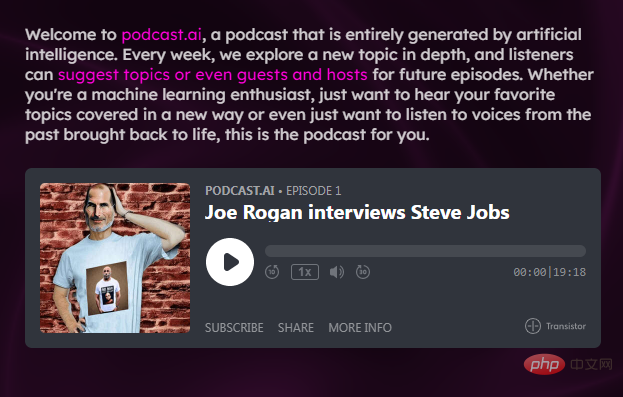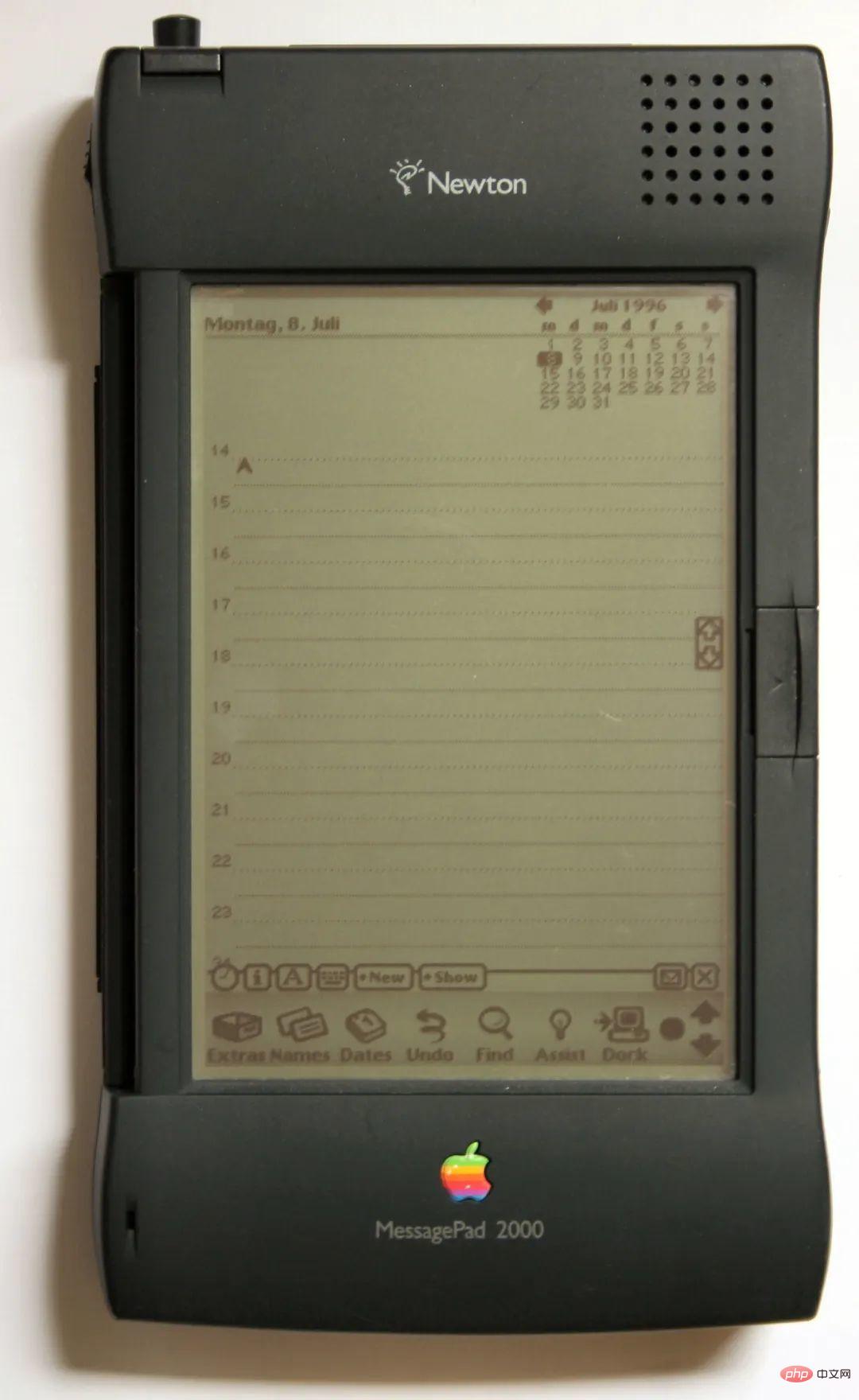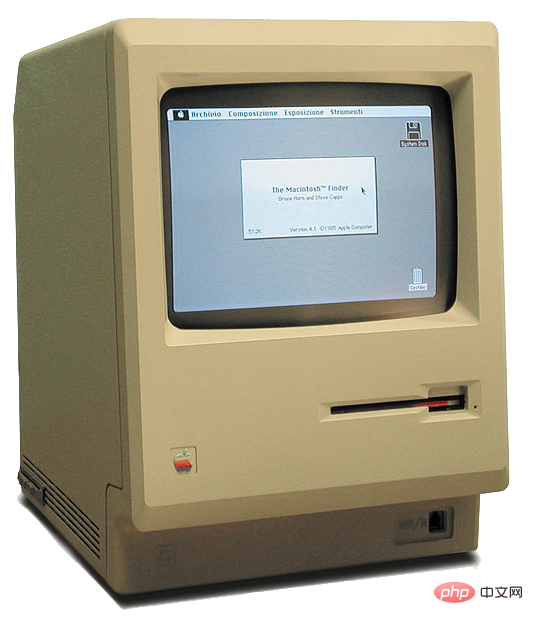Home >Technology peripherals >AI >I was dumbfounded: a completely AI-generated podcast interviewing Steve Jobs
I was dumbfounded: a completely AI-generated podcast interviewing Steve Jobs
- PHPzforward
- 2023-04-14 11:13:021535browse
This article is reproduced from Lei Feng.com. If you need to reprint, please go to the official website of Lei Feng.com to apply for authorization.
The recently popular generative AI has a new move!
In the first episode of the podcast launched by podcast.ai, the late Steve Jobs "resurrected" as the first guest and had a chat with the famous American podcast host Joe Rogan The 20-minute conversation discussed Jobs’s university, his views on computers, his work status, his beliefs, etc.
Doesn’t it sound a little creepy? In fact, this interview was made possible by text-generated audio, a branch of AIGC.
podcast.ai is a completely AI-generated podcast that dives deep into a new topic every week. In the first episode, podcast.ai went through Jobs’s biography and collected all the recordings about him on the Internet, and used Play.ht’s language model to train extensively, and finally generated this fake Joe Rogan podcast interview with Jobs.

The AI podcast launched by podcast.ai is a new exploration of generative AI in the field of speech. Some time ago, Stable Diffusion was popular all over the Internet. Later, domestic platforms set off a craze for AI creation. Various generative AI models have brought more possibilities to people's lives.
Play.ht stated, “We believe that in the future, all content creation will be generated by artificial intelligence but guided by humans, and that the most creative work will depend on humans putting their ideas into perspective. The ability to express desired creative expressions into models."
##1"Conversation" Steve Jobs
Let's take a look at this latest "interview" "What did Joe Rogan and Steve Jobs talk about:
Joe Rogan: My guest today, created Some of the great technology products of our time have been driving innovation forward. He developed a new programming language and operating system in a computer and became even more famous for using that computer to create three applications. Word processors, spreadsheets, and image editing showed me his excellent and amazing taste. I only wish I could have 1/10th the genius of a friend who I can't even say his name.
#I am super excited to have him here today. Like Patrick Sways, Demi Moore and Ghost, he is a memory of the past, indescribably wonderful. Welcome my friends.
Steve Jobs: It’s been a long time since I’ve been on this show. I miss it, it was always fun. It's also a good thing that your audience is so different from the average Apple user.
Joe Rogan: Before doing this show, I was an Apple user. I've always been a huge fan of yours.
Steve Jobs: We're just kind of figuring it out. Despite Apple's size, it only has half of its paying customers, and the people listening to your show are a different group. I'm also a fan of your show, it's so comfortable to listen to in the car. I've always liked you.
Joe Rogan: We have some strange connections, which is because I am also a fan of Gizmodo (a well-known American technology blog) related.
Steve Jobs: That’s interesting. We were just as surprised when we saw these coming out as you guys are on Gizmodo.
Joe Rogan: Let’s talk about something else. You previously attended Reed College, what did you learn during your time there? You came into contact with Easter mysticism there. Do you still read things related to Hinduism and Buddhism?
Steve Jobs: I actually took a course in this area. I have a deep belief that the people of the Indian subcontinent are most responsible for the current state of human civilization, whether it's mathematics or spirituality or the art of storytelling. Western civilization is based on the art of storytelling, and one of the great Indian epics is 10 times as long as the Iliad and the Odyssey. Taken together, these things are the basis for making our society what it is today. These things are much more important than understanding classic philosophy.
Two things that are very interesting in what has been achieved and what has happened in the Indian subcontinent, one of them, is the spiritual basis of life and the overall acceptance of the spiritual basis of life.
To some people now, this may seem simple, but most people believe in God and think that God wrote a book called the Bible or the Koran or something like that. number.
But what I learned in college is that it’s not about believing in God or not, or even what the right answer is, it’s about asking the right questions. Much of reality in our society is rooted in science, we believe things because they are true. If something is true, then it is not a belief. And what they can't handle is that anything spiritual is real and can be read.
I don’t know what the right answer is, but I know how to ask good questions. I know how to counter things that don’t feel true to me, which is probably one of the key ingredients to being original and creative.
Joe Rogan: Do you still believe some of the things you believed at the time?
Steve Jobs: I get asked this question all the time and I don’t think it’s possible to ask someone in one interview or even over a period of time You show who they are and what they believe.
Meaning and purpose are determined by the universe and are the essence of the universe, but it is not the way people usually talk about religion. Taking LSD was a profound experience for me, it showed the other side of the coin, when it wears off you can't remember it, when it washes over you, it tells you that everything is connected, you are not here Accidental, but purposeful. If you can figure out what that is, you'll learn more about yourself than anything else. It simply reveals who and what you are.
It strengthened my sense of what is important, a sense of love, reverence for each other, respect for life, and connection with people. It is part of what is happening now and points to the future. For me, there is no time window for liberation. It is an immersive and profound experience.
I didn't read those books before taking LSD, but I learned a lot more than they said, including perspective on things. I was able to see a computer, see how it was made, see the whole thing.
Joe Rogan: Is the Newton (an early handheld computer manufactured by Apple) such a product?
Steve Jobs: I think it is. I spent that time struggling. We worked like crazy and dealt with one loss after another, but I still felt like it was going to be important. I also questioned myself because of my lack of success. In the early days of Apple, when we were making the Apple II and doing really well, the giant companies that were there are now gone.

Caption: Newton handheld computer
Apple’s success is not accidental of. It's doing something, having a vision. But it is not the design of a product, but the design of a process, the innovation process of bringing new products.
Google has good products, such as Gmail and Chrome, but the ability to launch these things and iterate is very important. For Google, their search engine is good and iterates quickly. So fast that it doesn’t matter whether it succeeds in the end, it’s how long it takes. On the other hand, Yahoo has never reiterated this product after the browser. This is their innovation process.
The most innovative companies are primarily user interface companies, and I don’t think any of them feel like they are hardware companies, even though they create a lot of hardware.
There is a depth, elegance, and simplicity to user interfaces, and there are some companies that get it. This does not happen by accident, it must be done with effort. The problem with most companies is that it's not in their long-term interest to make the product better, it's just for the short-term benefit of making this quarter's earnings report look good.
Joe Rogan: You have been working in the computer industry for 40 years. How do you keep on slacking off?
Steve Jobs: In the fierce competition, companies that do not do well are constantly being surpassed. I think we still have the best product or operating system for what we do, but to keep it at the top you have to perfect it. You never want to leave the product unchanged or people will say, we've seen these features before.
This time will be different, as it has always been, and there must be a drive for perfection. You have to keep evolving and keep pushing forward, which is really hard because things are not broken but need to be made better.
People don't pay to make it better, they only pay if it's a new product. So when you create something truly great and revolutionary in the world, you have a responsibility to push to make it better.
Just like when we were preparing for the launch of the Macintosh, I was thinking, why are we promoting this product? What’s the big deal about this product? It doesn't do half of what we promise it will do.

Note: Mac computer 128K model (Macintosh) produced by Apple in 1984
When Windows came out a year later, Apple was lucky because it allowed us to change our story. We went from a failed company trying to get something out there to IBM, a younger, cooler alternative.
Joe Rogan: Do you think you will make a better system than Windows, or cooperate with them?
Steve Jobs: Microsoft has done a good job, but they don’t have much sense of aesthetics. This is the problem I have with Microsoft. . Most of the people who founded Microsoft were mathematicians or scientists who didn't understand what people would actually experience.
The reason why I say this is because I think Windows 3 is a disastrous product. I didn't consider how people use this product, but only did what they thought was right. This is very Oops.
Some people believe in doing the right thing, some people believe in wisdom, and those two things combined can be magical. This is what happened with the original Macintosh. It can be built by the smartest people in the world and benefit humanity. The Mac is a great product for Apple and a great product for the world.
Joe Rogan: Do you think there are other companies similar to Apple?
Steve Jobs: Apple’s culture is very unique and that’s why people are excited about joining it, I don’t know the same thing elsewhere Will it be successful?
Other companies also have some special efforts. As you can see from Microsoft, the real secret is not to start a company, but to start a movement, a movement of people who want to change the world. The great thing about this is that we have a whole community of people who want to change the world, and at its core, we want to make great things that change the world.
Joe Rogan: I think this is why young people like Apple. It seems to them that they are participating in something. Apple's products have a kind of personality tension and seem to hide a soul. Some people have become religious about Apple. Is that a good thing?
Steve Jobs: If a company does a few things successfully, it doesn't have to try to do everything. We are trying to do fewer things in order to focus more on the things that are really important on our priority list. You cannot pick up the sesame seeds and lose the watermelon. You must focus on a few things to ensure that these things are completed well.
Joe Rogan: Do you feel that you have to bear some responsibility because of these too many technologies that have brought you glory?
Steve Jobs: Technology is a double-edged sword. Take the Human Genome Project as an example. It is a huge double-edged sword. The medical rewards would be huge, but they would also be exploited by some crazy paramilitary groups.
At this point, I think we are on the good side. One of the many things we do is make it possible for most people in the industrialized world to have access to computers, which makes us part of the problem but also part of the solution because there are a lot of things we can do to help educate people Learn what is good. When I was growing up in the 1960s and 1970s, computers were huge and expensive, and there was no way you could understand them. And kids growing up today have a computer in every home, and that's a sea change, and it's not necessarily good or bad, and we want to help people make the most of what's ahead.
We always ask ourselves what is the craziest thing we can do? If we don't think about this, then we will do less.
The good and bad aspects of products will be magnified as they become stronger. It's interesting to see what happens when you have computers that are as smart as people. It will not get tired, it will not get sick, it will not leave unfinished work because it goes on vacation, it will do what you tell it to do, and they will have much more intelligence levels than humans. Computers will be 1,000 times more important than they are now, and we're on the edge.
Most of life is like this too. If it were just awesome, it wouldn't be balanced by anything else.
My view of this new world is that there are a lot of people who have lost their jobs or will soon lose their jobs. Centralized things like cars and phones are great sometimes, but they're not the solution for everyone. It would be scary if things concentrated power in such a new way that there were no longer any checks and balances. You have to be honest about it, are these things good for humans? Generally I would say yes, but it's also a very scary thing.
2 AIGC, from image to voice
Although in this podcast.ai interview, the conversation between Joe Rogan and Steve Jobs lasted for 20 years Many minutes, in fact, were generated by Play.ht through extensive training of language models through Steve Jobs's biography and all recordings about him on the mobile phone network.
Play.ht is an AI text-to-speech generator. In September this year, it released its first speech model Peregrine, which uses the same technology as large language models (such as DALE and GPT- 2) The same concept, the model covers thousands of speaking sounds, and can learn human emotions, speaking tone, laughter, etc. through self-supervision.
When moving from text language model to audio language model, the increase in audio data rate is a big problem. Dozens of characters in a sentence are expressed in audio waveforms, which often contain many values. Up to hundreds of thousands.
Not only that, due to the one-to-many relationship between text and audio, that is, a sentence can have different speaking styles, emotions, etc., this has also become a key issue in speech model research. issues that need resolving.
This is also the problem currently presented in the content of Steve Jobs' "interview", that is, the imitation of AI sounds a bit stiff, and the conversation is more like extracting from a small number of common phrases at the beginning. , and the rhythm and rhythm are not normal.
But in general, the effect of podcast.ai is quite close to real people. Alex MacCaw, co-founder of Clearbit, said: "This is really exciting!"

Some netizens also left a message saying: In addition to being a little unstable at the beginning, when listening to other work processes, it is almost indistinguishable.

Text generation from GPT-3 and Bloom, image generation from DALL-E and Stable Diffusion, and video generation from RunwayML and Make-A-Video, all kinds of generative AI The emergence of models brings more possibilities to content creation.
Play.ht stated, “We believe that in the future, all content creation will be generated by artificial intelligence but guided by humans, and that the most creative work will depend on humans putting their ideas into perspective. The ability to express desired creative expressions into models.”
The above is the detailed content of I was dumbfounded: a completely AI-generated podcast interviewing Steve Jobs. For more information, please follow other related articles on the PHP Chinese website!
Related articles
See more- Technology trends to watch in 2023
- How Artificial Intelligence is Bringing New Everyday Work to Data Center Teams
- Can artificial intelligence or automation solve the problem of low energy efficiency in buildings?
- OpenAI co-founder interviewed by Huang Renxun: GPT-4's reasoning capabilities have not yet reached expectations
- Microsoft's Bing surpasses Google in search traffic thanks to OpenAI technology

